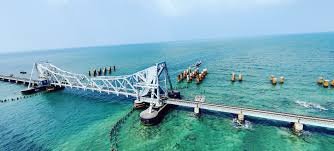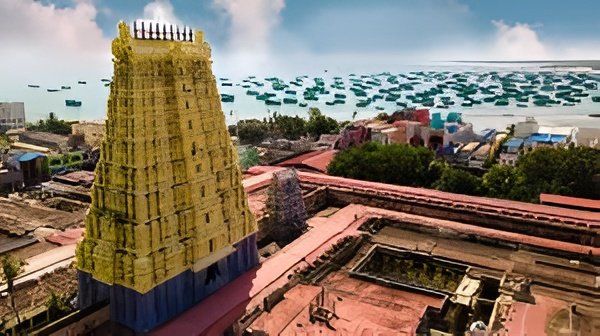Rameswaram is a revered spiritual destination in India, renowned for its deep historical roots, vibrant culture, and scenic splendor. Nestled in Tamil Nadu on Pamban Island, it holds significance for both religious pilgrims and general tourists alike. This comprehensive article explores Rameswaram’s history, culture, top attractions, connectivity, economy, and frequently asked questions in detail.
Location and Geography
Rameswaram lies on Pamban Island at the southeastern tip of India, connected to the mainland by the iconic Pamban Bridge. Situated in the Gulf of Mannar, it is roughly 40 kilometers from Mannar Island, Sri Lanka. Its coordinates are approximately 9°17′N latitude and 79°18′E longitude, and it covers about 53 km².
Key Details:
| Element | Details |
|---|---|
| Location | Pamban Island, Tamil Nadu, connected by Pamban Bridge |
| Key Landmark | Ramanathaswamy Temple (Jyotirlinga, Char Dham site) |
| Other Attractions | Dhanushkodi, Adam’s Bridge (Ram Setu), Agni Theertham, Kalam Memorial, Water Bird Sanctuary |
| Festivals | Maha Shivratri, Diwali, Pongal |
| Culture | Predominantly Hindu, Tamil language, vegetarian and seafood cuisine |
| Ecotourism Spots | Karankadu, Kurasadai, Ariyaman, Pitchaimoopan Valasai |
| Typical Activities | Temple rituals, bathing in sacred wells, pilgrimages, sightseeing, beach visits |
| Best Time to Visit | October – April (Pleasant weather, key festivals) |
| Accessibility | By road (bus/private car from Madurai, Chennai), rail (direct trains), nearest airport Madurai (170km) |
| Economic Drivers | Religious tourism, ecotourism, fisheries |
| Tourism Revenue | Doubled to ₹1.72 crore in FY 2023-24 due to rising visits |
| Accommodation Range | Budget (₹700–₹2,000/night), Mid-range (₹2,000–₹4,000), Premium (₹4,000–₹7,000) |
| Food Cost (per meal) | Budget: ₹100–₹200, Mid-range: ₹200–₹400, Premium: ₹400+ |
| Local Transport | Autos, taxis, cycle rickshaws, tour buses, private cabs |
| Safety | Generally safe for travelers; usual travel precautions advised |
Average Cost of Rameswaram Travel (2025)
| Category | Price (approx.) | Notes |
|---|---|---|
| 3-day/2-night Budget Package | ₹10,000–₹15,000 per person | Incl. travel ex-Madurai, stay, most meals |
| 3-day/2-night Mid-range Package | ₹20,000–₹25,000 per person | Incl. better hotels, guided tours |
| Premium 3-day/2-night Package | ₹40,000–₹62,000 per person | 4-star hotel, all-inclusive, VIP temple |
| Hotel Room (budget) | ₹700–₹2,000/night | Numerous options available |
| Hotel Room (mid-range) | ₹2,000–₹4,000/night | Family-friendly hotels |
| Hotel Room (premium) | ₹4,000–₹7,000/night | Includes amenities and sea views |
| Meals (per day, budget–premium) | ₹300–₹1,200 per person | Local restaurants vs. hotel dining |
| Taxi/Auto Day Hire | ₹1,200–₹2,500 | For all key sites in town |
| Madurai–Rameswaram Train (one-way) | ₹200–₹1,200 | Varies by class (sleeper to AC) |
| Airfare to Madurai (from major cities) | ₹4,500–₹8,000 | Seasonal variations apply |
| Entry Fee (attractions) | Most temples: Free/₹20–₹200 | Varies by darshan and camera ticket |
| Ecotourism Experience | ₹400–₹1,500 per person | Boating/glass boat/mangrove rides |
Popular Multi-Destination Packages (2025)
Typical Accommodation Costs (per night, 2025)
| Hotel/Resort Star | Price Range (INR) |
|---|---|
| Budget/Guesthouse | ₹700–₹2,000 |
| 3-Star Hotels | ₹2,000–₹3,900 |
| 4-Star Hotels | ₹3,900–₹7,000 |
| Premium Resorts | ₹4,500–₹7,000+ |
Other Essentials
| Item | Price (Approx.) | Notes |
|---|---|---|
| Pamban Bridge Visit | Free/₹20 for camera | Must-see engineering marvel |
| Beach/Temple Entry | Free or minimal charge | Major sites generally free |
| Souvenirs & Handicrafts | ₹200–₹2,000 | Shell products, handicrafts |
| Boating (ecotourism) | ₹400–₹1,200 | Per person/family |
Historical Significance
The town’s history is intertwined with Hindu mythology and epic tales. According to the Ramayana, Lord Rama built a bridge (“Adam’s Bridge” or “Ram Setu”) from Rameswaram to Lanka to rescue his wife, Sita, from the demon king Ravana. The renowned Ramanathaswamy Temple stands here as a testament to these legends.
Over the centuries, Rameswaram witnessed the reign of various South Indian kingdoms, including the Cholas, Jaffna kings, and short periods under Muslim invaders like Malik Kafur. Each contributed to the temple’s legacy and the island’s unique cultural harmony.
Cultural Heritage
Rameswaram is predominantly Hindu, and its spiritual aura pervades everyday life. Tamil is the main language, with Hindi and English also understood. Major Hindu festivals, including Diwali, Maha Shivratri, and Pongal, are celebrated grandly. Traditional cuisine is mainly vegetarian, with coastal influences bringing seafood delicacies to the table.
Handicraft markets, folk arts, and religious music reinforce the town’s living heritage. Pilgrims often perform ancestral rites and spiritual cleansings at sacred wells (“teerthams”) and the Agni Theertham sea.
Tourist Places in Rameswaram
Rameswaram offers a blend of revered temples, historic ruins, serene beaches, and wildlife attractions:
- Ramanathaswamy Temple: A Jyotirlinga shrine and Char Dham pilgrimage site, celebrated for its legendary origin and dravidian architecture, including the world’s longest temple corridors.
- Adam’s Bridge (Ram Setu): Believed to be built by Rama’s army, this chain of shoals between India and Sri Lanka has fascinated mythologists and scientists alike.
- Dhanushkodi: Known as the “Ghost Town,” Dhanushkodi was devastated by a cyclone in 1964. It now attracts visitors seeking solitude and history at the island’s tip.
- Lakshmana Tirtham: A tranquil pond-temple dedicated to Lord Lakshman, offering both relaxation and spiritual cleansing.
- Kalam National Memorial: Honoring Dr. APJ Abdul Kalam, India’s “Missile Man,” this museum exhibits his life, achievements, and dreams.
- Kunthu Kal Beach & Water Bird Sanctuary: Natural havens for relaxation, bird-watching, and aquatic life observation.
- Sea World Aquarium: A family-friendly spot housing species like sharks, octopuses, and lobsters.
- Ecotourism Sites: The district’s new ecotourism spots, Karankadu, Kurasadai, Ariyaman, and Pitchaimoopan Valasai, offer mangrove boating, glass boat rides, and pristine beaches, growing rapidly in popularity.
Routes and Connectivity
Rameswaram is accessible by:
- Road: Well-connected highways link Rameswaram to Chennai, Madurai, Trichy, and other major cities. TNSTC and private buses operate regular services.
- Rail: The railway terminal connects directly to Chennai and Madurai. Travelers enjoy the scenic crossing over the Pamban Bridge.
- Air: The nearest airport is Madurai (170 km), with connections to Chennai, Kochi, and beyond.
The journey is widely regarded as part of the pilgrimage experience, offering transformative views of the coastline and the sea.

Economic Significance and Revenue
Tourism is a primary economic driver, supported by fisheries and related industries. The emergence of ecotourism sites led district revenue to soar, reaching ₹1.72 crore in 2023-24, doubling the previous year’s figure. Continuous facility upgrades and increased tourist awareness contribute to ongoing economic vibrancy.
Location Map
Rameswaram can be pinpointed as the island at the edge of the Indian peninsula, famously connected by the Pamban Bridge to mainland Tamil Nadu.
Key Attractions:
| Attraction | Description | Religious/Cultural Significance |
|---|---|---|
| Ramanathaswamy Temple | Major Shiva shrine, Jyotirlinga, architectural marvel | Char Dham, sacred purification, mythological |
| Adam’s Bridge (Ram Setu) | Chain of shoals believed to be Rama’s bridge | Link to Ramayana epic |
| Dhanushkodi | Abandoned town, tranquil beach, historical ruins | Spiritual purity, solitude |
| Lakshmana Tirtham | Sacred pond-temple | Ritual cleansings, ancestral rites |
| Kalam National Memorial | Museum dedicated to Dr. APJ Abdul Kalam | Inspirational, educational |
| Ecotourism Sites | Boating, mangroves, beaches, glass boat rides | Family/leisure tourism |
FAQs About Rameswaram
Why is Rameswaram famous?
Rameswaram is renowned as one of Hinduism’s holiest pilgrimage sites. It is home to the sacred Ramanathaswamy Temple, is believed to be the place where Lord Rama built the bridge to Lanka, and forms part of the revered Char Dham circuit.
What are the main tourist attractions in Rameswaram?
The Ramanathaswamy Temple, Adam’s Bridge (Ram Setu), Dhanushkodi, Lakshmana Tirtham, Kalam National Memorial, Water Bird Sanctuary, Kunthu Kal Beach, Sea World Aquarium, and several new ecotourism sites are among the top attractions drawing both domestic and foreign visitors.
How can Rameswaram be reached?
Rameswaram is accessible by road, rail, and air. The Pamban Bridge, which connects the island to Tamil Nadu’s mainland, is both a scenic and engineering marvel.
What is the best time to visit Rameswaram?
The ideal time to visit is between October and April, when the weather is pleasant and festivals offer a unique cultural experience. Pilgrims, however, visit year-round for spiritual rituals and temple festivals.
What is the significance of the Ramanathaswamy Temple?
This grand temple is one of India’s twelve Jyotirlinga shrines to Shiva. Its corridors are the world’s longest, and it is renowned for its mythological connection to Lord Rama and the Char Dham pilgrimage.
What role does Rameswaram play in Hindu mythology?
It is famously mentioned in the Ramayana, where Rama worshiped Shiva and built a bridge (“Ram Setu”) to Lanka. Rituals at the temple, including bathing in 22 sacred wells, continue to embody these ancient traditions.
How significant is tourism revenue to Rameswaram?
Tourism, bolstered by temple visits and ecotourism, is crucial. Revenue from ecotourism alone reached ₹1.72 crore in 2023-24, with further growth anticipated as new sites open and facilities improve.
What kind of food and culture can be experienced?
Local cuisine favors South Indian vegetarian fare; seafood is plentiful near the coast. Colorful festivals, folk music, crafts, and rituals provide a true taste of Tamil culture.
Are there festivals or special events?
Major Hindu festivals and unique temple events occur throughout the year. Special fairs, temple rituals, and even beach festivals are held, providing rich experiences for visitors.
Is Rameswaram suitable for family travel and eco-tours?
Yes, besides religious tourism, families can enjoy beaches, bird sanctuaries, boating, and visits to museums and aquariums. The growing ecotourism sector provides many options for all ages.
Conclusion
Rameswaram is a unique convergence of spiritual devotion, natural beauty, and historical legacy. Whether seeking religious solace, scenic marvels, or cultural immersion, this sacred island offers a transformative experience unlike any other top destination. Continuous development in tourism infrastructure promises even more enriching journeys for generations to come.
